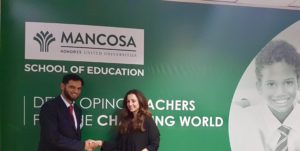
Accra, Ghana, December 24, 2019//-Laura Kakon, Chief Strategy Officer of Honoris United Universities has disclosed that developing 21st century workplace skills is central to how the school is structured.
According to her, it engages with students on their development and societal needs to enable them fit into the labour market after their graduation.
Madam Kakon who disclosed this in an interview with African Eye Report, explained: “Recent developments that are specifically designed to further enhance the employability of our graduates for 21st century job market include a new Academic Council. Its mandate is to promote the sharing of skills, resources and inspiration across the network”.
The Academic Council aims to boost collaborative intelligence across the continent, thereby preparing graduates to be agile, mobile employees with entrepreneurial mindset who are fully equipped with 21st century soft and digital skills, she added.
Madam Kakon noted that the first private pan-African higher education network is committed to preparing and educating the next generation of African leaders and professionals able to impact regionally in a globalized world.
How different is your pedagogical approach from others
When asked how different is her school’s pedagogical approach from others, Madam Kakon said: “The Honoris model differs in the way it promotes intra-regional and international cultural learning and its focus on collaborative intelligence”.
Through an exciting range of programmes, including international exchanges and collaborative projects, Honoris faculty and students benefit from the sharing of academic practices, real-world expertise, and multi-cultural immersion”.
She continued: “ In practical terms, our collaborative approach means bringing together experts, academics and students to find solutions to specific challenges. An example would include a collaboration between the two Honoris network institutions of EMSI in Morocco and Université Centrale, in Tunisia”.
A pedagogical agreement has been signed between the two institutions in order to create a real bridge between the two countries, facilitating mobility between Morocco and Tunisia, Madam Kakon, added.
This agreement she explained encourages scientific exchange between EMSI and Université Centrale, underpins the organisation of our Solar TIGMI project and our participation in the Solar Decathlon Africa contest.
This is a really important collaboration because renewable energy is a collaborative axis that has social and environmental impacts, through the generation and availability of energy in rural areas.
When experts from different cultural or academic backgrounds can come together and collaborate, we have a better chance of designing effective real-world solutions for our own specific environmental and social problems.
Quality Programmes are key to the 21st century work place
The REGENT Business School’s specialist employability unit, called the iLeadLAB, aims to create a new breed of entrepreneurs with the skills, knowledge, and personal attributes to succeed in their challenging and high-tech world.
Through mentorship and hands-on practice, especially using the latest technology, such as 3D printing, entrepreneurs will bridge the gap between theory and its implementation in the real world.
They will learn how to set up and run their own businesses, becoming champions of the 4th Industrial Revolution and impacting tomorrow’s economies and communities, Madam Kakon told this publication.
“These are absolutely critical learnings because the modern global economy and jobs market demands that the individual is self-confident, mentally agile and able to problem-solve.
Technologies are new today, but they may very well be old in a short space of time. However, by preparing students to adapt, to learn quickly and to be able to speak the language of innovation, we are able to develop graduates capable of flourishing even in a world of constant flux”.
She was quick to add: “We have also introduced a co-op education scheme, for example at Université Mundipaolis in Morocco, whereby our students alternate between going to school and doing internships”.
This scheme according to Madam Kakon allows students to spend time with employers while in school so when they graduate, they have the edge of professional experience in their chosen field and of adapting to the culture of the world of work.
African Eye Report


